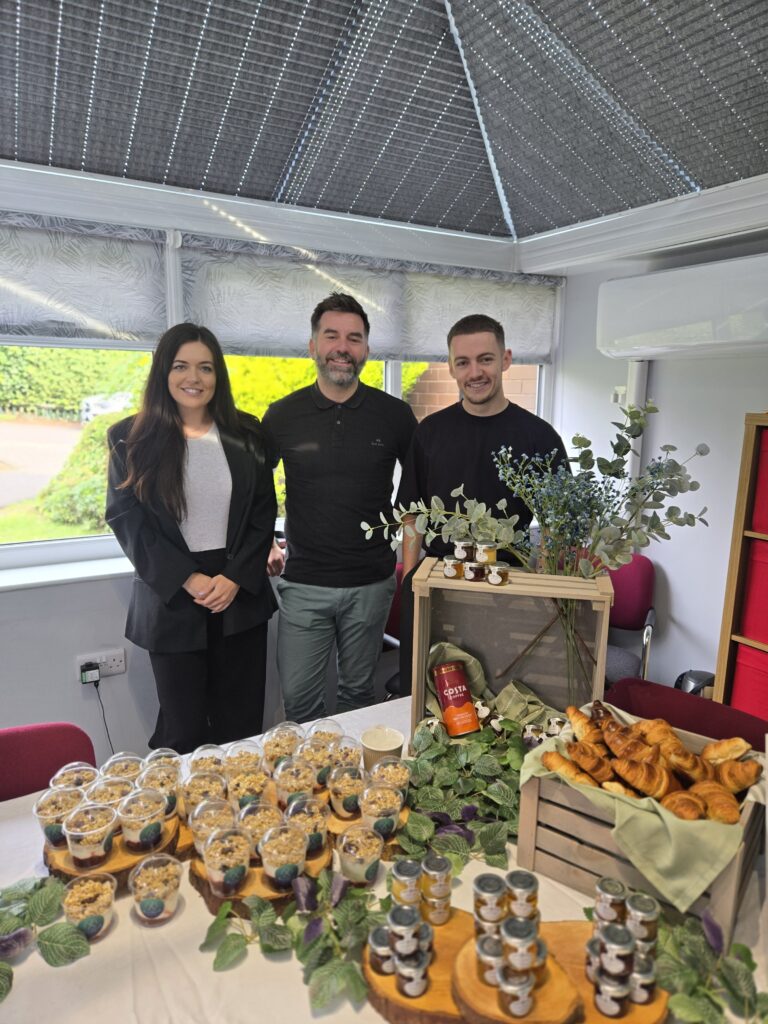News and Articles at Bookmark
Pioneering Connections and Empowering Careers
The Protocol Group joins Affinity Workforce Solutions
The Protocol Group joins Affinity Workforce Solutions
We’re pleased to share that The Protocol Group is now part of Affinity Workforce Solutions Ltd.
Our brands — Protocol FE, Bookmark and eSafeguarding — will continue to operate under their existing names, now supported by Affinity’s national network and resources.
This move strengthens our ability to serve colleges, training providers and education settings across the UK, and enhances the safeguarding and compliance services we offer.
Together, the group now supports around 30,000 candidates placed each year. The deal sees three established brands join the Affinity group:
- Protocol FE, a recruitment partner to colleges and training providers
- Bookmark, supplying staff across education settings
- eSafeguarding, a secure platform for processing and managing DBS checks
The Protocol Group will continue to trade under its own name, with teams now operating as part of Affinity’s national network. The move strengthens Affinity’s presence in the East Midlands and adds an additional compliance service offering for existing clients and enhances its managed service offer to the FE sector.
As a Crown Commercial Service-approved supplier, Affinity delivers managed recruitment solutions to schools, colleges and Multi-Academy Trusts across the UK. The integration of Protocol’s services and eSafeguarding platform strengthens that offer further – particularly for public sector clients looking for joined-up recruitment and safeguarding support.
Esme Bianchi-Barry, CEO of Affinity Workforce, said: “Protocol strengthens our presence in further education and brings a digital compliance offer that’s already trusted across the sector. It’s a considered step that supports our growth and the high standards our clients expect.”
Bill Williams, Interim CEO of The Protocol Group, said: “We’ve built our reputation on sector knowledge and trust. Affinity brings national scale and infrastructure that will help us do more of what we do best — for the clients and settings we know.”
Learning Disability Week: Why We Should Celebrate SEND Teachers
Learning Disability Week: Why We Should Celebrate SEND Teachers
Learning Disability Week is a brilliant chance to shine a light on inclusion, raise awareness, and celebrate the strengths and talents of people with learning disabilities.
But it’s also the perfect time to say a big thank you to the people working behind the scenes to make it all happen — our amazing SEND (Special Educational Needs and Disabilities) teachers.
Everyday heroes
SEND teachers are true champions. They don’t just teach – they support, guide, encourage and advocate for their students every single day. Their job is all about understanding each pupil’s unique needs and helping them reach their full potential, often in ways that aren’t always obvious to others.
They adapt lessons, find creative solutions, and offer the kind of support that can make a real difference to a child’s confidence and progress. And they do all of this with patience, kindness, and an incredible amount of care.
It’s all about the individual
SEND teaching is never one-size-fits-all. It’s about getting to know each child as an individual – what helps them learn, what might be challenging, and what brings them joy.
Whether it’s using visual aids, breaking tasks down into smaller steps, or creating calm, supportive spaces – SEND teachers tailor everything to fit the child, not the other way round.
And while the progress might not always look the same as it does in mainstream school settings, it’s just as important, and maybe even more rewarding.
More than just teaching
The emotional side of SEND teaching can’t be overlooked. It takes a huge amount of empathy, emotional strength and resilience. There are tough days – but it’s also incredibly rewarding.
There’s nothing quite like seeing a student achieve something they’ve been working so hard towards – whether it’s a piece of writing, making a new friend, or simply having the confidence to try something new. Those moments of progress, no matter how big or small, are so important.
For many SEND teachers, those are the moments that stay with them forever and remind them exactly why they do what they do.
Making a bigger impact
SEND teachers also help challenge stereotypes and push for more inclusive schools and communities.
They speak up for their students, help raise awareness, and show the world that learning differently isn’t a limitation.
They’re also there for parents, carers, and the wider school team – often acting as the go-between to make sure everyone is on the same page and that the child gets the best support possible.
So, let’s take a moment to celebrate SEND teachers and all the brilliant work they do. Let’s recognise their dedication, their creativity, and the huge role they play in helping every child feel seen, valued, and capable.
SEND teachers don’t just make a difference – they are the difference. And they deserve to be celebrated.
If you feel like you could make a difference and take a step into a SEND teaching role, contact our team today to discuss further.
Music is Vital in Education – Here’s Why
Music is Vital in Education – Here’s Why
Music is everywhere. From the songs we listen to on the radio to the soundtracks of our favourite films, it is universal and a part of our everyday lives. But beyond just being enjoyable, music also plays a crucial role in education.
Whether it’s learning an instrument, singing in a choir, or simply enjoying a tune, music offers students a wide range of benefits that can help them in and out of the classroom.
So, why is music such an important part of education? Let’s dive into how it helps students grow, learn, and thrive.
1. Helping the brain work better
It’s no secret that music has a powerful effect on the brain. Research shows that learning music can help students improve their memory, focus, and problem-solving skills.
This is because when students learn to play an instrument or read music, they are strengthening areas of the brain that are also involved in other subjects like reading, maths, and science. In fact, students who are involved in music tend to perform better academically in these areas.
For example, learning to play rhythms and melodies involves recognising patterns — something that’s directly linked to improving skills in subjects like maths and reading. It’s all about connecting the dots between different types of learning.
2. Boosting academic performance
Music isn’t just fun; it can also help students do better in other subjects. Studies have shown that students who take part in music education often perform better in maths, reading, and even science.
Music teaches discipline and focus, both of which help students concentrate better in their studies. Plus, the skills they develop through music, like critical thinking and attention to detail, come in handy when tackling tricky schoolwork.
When students learn to play an instrument, they are also learning how to approach challenges and think strategically – skills that are useful in every area of learning.
3. Encouraging creativity and self-expression
One of the best things about music is that it allows students to express themselves in creative ways.
Whether it’s composing their own music or singing a song, music gives students a chance to explore their ideas and emotions. This kind of creative freedom is valuable, especially in a school system where many subjects focus on tests and exams.
Music provides a way for students to explore their unique voice and see the world through a different lens. It encourages them to think outside the box and experiment with new ideas, which helps them grow as individuals and as learners.
4. Developing emotional intelligence
Music also helps students build emotional intelligence – the ability to understand and manage their emotions, as well as empathise with others. For example, when students sing in a choir or play in a band, they learn to listen to each other, work together, and share responsibility.
These activities teach them how to cooperate, manage their feelings, and communicate more effectively.
On top of that, the process of performing or creating music often involves overcoming challenges and pushing through difficult moments. This builds resilience and boosts confidence, both of which are important life skills.
5. Improving social skills
In addition to emotional growth, music is great for developing social skills. Music often involves teamwork – whether it’s playing in a band, singing with others, or collaborating on a school performance. Through these experiences, students learn how to communicate, support each other, and work towards a common goal.
Participating in music activities also helps students make new friends and feel part of a community. This sense of belonging can boost their confidence and make them feel more engaged with school life.
6. Supporting mental health and well-being
Let’s face it: school can be stressful at times. Music offers a welcome break from the pressures of exams and assignments. Studies have shown that listening to or making music can help reduce stress, improve mood, and even boost energy levels. For students, music can be a great way to relax, unwind, and recharge.
In fact, many students report feeling happier and more satisfied with their school life when they have the chance to engage with music. It’s a fantastic way to look after their mental health and help them stay motivated.
7. Long-term benefits
The benefits of music aren’t just for now – they can last a lifetime. The skills and values students gain through music, such as perseverance, teamwork, and creativity, are useful far beyond the classroom. These qualities can help them in their future careers, relationships, and personal lives.
Whether they go on to pursue a career in music or use the skills in other areas, the lessons learned through music education stay with students for years to come.
8. It’s fun!
School can sometimes feel like a series of tasks to get through. Many subjects can be seen as “boring” or just things you “have to do.” But music is different.
Whether it’s learning an instrument, singing in a choir, or simply making music with friends, it’s a subject that brings joy and excitement to the school day.
When students have the chance to explore music, they often look forward to their lessons, which can help break up the routine of more academic subjects. It’s a fun and creative outlet that can energise students, boost their enthusiasm, and give them a much-needed break from the more structured parts of their school schedule.
Music is universal, it has no boundaries and can be a thread between cultures, communities and circumstances. It is a powerful tool to not only help students academically, but socially and personally.
To find opportunities teaching music in schools, contact our friendly team today.
More Than Recruitment: Why We’re Serving Up Breakfast in Schools
More Than Recruitment: Why We’re Serving Up Breakfast in Schools


At Bookmark, we believe in doing things differently.
We know that making a real impact in education goes far beyond filling vacancies. It’s about partnership. It’s about people. And sometimes, it’s about pastries!
What better way to start the week than with fresh croissants, great coffee, and even better company?
This week, we launched our new initiative, Breakfast by Bookmark, with a simple idea at its heart: elevating education, one breakfast at a time.
Our goal? To give back to the schools, colleges, and organisations we work with. To show up not just as recruiters, but as partners who genuinely care. We want the educators we support to feel valued, seen, and appreciated; not just when they have staffing needs, but always.
We kicked things off at Carlton Infant School, where the team arrived bright and early, transforming the conservatory into a warm and welcoming breakfast hub.
There were home-baked croissants, granola pots and mini jars of spreads (which, we’ll admit, stole the show). Coffee and tea were flowing, and more importantly, so were the conversations. It was a chance to slow down, connect, and spend quality time with the people who keep schools running day in and day out. No pressure. No pitches. Just time together.



Why We’re Doing This
It’s a free breakfast, yes – but it’s more than that. We live in a fast-paced world where instant results are often expected. But we know that true, lasting relationships are built through care and consistency.
It’s our way of saying thank you.
It’s a chance for educators to connect, chat, and recharge.
It’s about community. About support. About showing up.
Reminding staff that they’re not just clients in our system; they’re partners in a shared mission to support and elevate education.
We’re not just recruitment consultants; we’re part of the community. And this is our way of giving back – no strings attached.



This is just the beginning. We want Breakfast by Bookmark to become a regular feature in schools and colleges across the communities we serve.
- Is there a school that’s been under pressure lately?
- A college you’ve worked closely with who deserves a moment of appreciation?
- Even your child’s nursery or local school; could they use a morale boost?
Let us know. We’re ready, and we’d love to bring Breakfast by Bookmark to them.
We’re here to do more than recruit. We’re here to care, connect, and contribute. And yes, serve up a pretty decent granola pot, too.
Get in touch with our team today to find out more or to book a breakfast session.
Because sometimes, the smallest gestures make the biggest difference.
Better Bookmark It – How to Stay Ahead in the Secondary School Job Market
Better Bookmark It – How to Stay Ahead in the Secondary School Job Market
The secondary teaching job market in the UK is evolving rapidly in 2025, presenting both challenges and opportunities for educators.
With increasing pupil numbers and a growing demand for qualified teachers, staying ahead requires strategic planning and proactive engagement. Bookmark is here to guide you through this dynamic landscape.
Understanding the current landscape
Recent data highlights a significant rise in teacher vacancies, with full- and part-time positions increasing by 20% over the past year. Despite this, recruitment remains below target, with secondary school teacher recruitment nearly 40% below the required levels.
This widening gap means schools are urgently looking for qualified, enthusiastic professionals who can hit the ground running.
But competition remains fierce – especially in popular regions and subjects. To stand out, candidates need to be visible, well-prepared, and ready to embrace new ways of teaching and learning. That’s where having the right support behind you can make all the difference.
Our top tips to stand out
- Specialise in high-demand subjects
Some subject areas are more in demand than others. If you’re qualified in Physics, Chemistry, Maths, or Modern Foreign Languages, your skills are highly sought-after.
Even if you’re currently teaching another subject, upskilling or gaining additional qualifications could boost your chances of securing a role.
- Leverage technology and digital tools
Technology continues to shape the classroom. Schools value candidates who are confident using online platforms, interactive tools, and blended learning approaches. Taking the time to develop your digital teaching skills could give you a strong advantage.
- Pursue Continuous Professional Development (CPD)
Keeping your knowledge and skills up to date is vital. Whether through online courses, in-person training or peer learning, ongoing CPD not only improves your teaching but also shows employers you’re serious about your professional growth.
- Consider flexible and part-time roles
Flexibility is increasingly valued by both teachers and schools. Supply and part-time roles can offer variety, reduce burnout, and allow you to explore different school environments – all while building experience and staying active in the profession.
- Perfect your application and interview technique
It might sound obvious, but the basics matter. Tailor your CV for each application, highlight your impact with clear examples, and be ready to demonstrate your knowledge of the school’s values and needs. Don’t be afraid to ask for feedback – learning from the process is key.
How Bookmark can support you
At Bookmark, we offer a tailored recruitment service designed specifically for secondary educators. Whether you’re looking for a short-term role or a permanent placement, we work closely with you to understand your skills, goals and preferences – so we can match you with the right school at the right time.
Our team has years of experience in education recruitment, and we know the sector inside out. We don’t just send your CV to every vacancy – we guide, support and advocate for you throughout the whole process. We’re here to help you grow your career, whether you’re newly qualified or an experienced teacher looking for your next challenge.
And because we work directly with schools across the country, we have access to opportunities that aren’t always advertised elsewhere – meaning you get to hear about the best roles first.
If you’re ready to take the next step in your teaching journey, you’d better Bookmark it.
Contact us today to find out how we can help you stay ahead in the secondary school job market.
Exam Season: Helping Students Put Less Pressure on Themselves
Exam Season: Helping Students Put Less Pressure on Themselves
As exam season approaches, it’s easy to feel the weight of expectations – from teachers, parents, and even from ourselves. For many students, the stress and anxiety surrounding exams can be overwhelming, often leading to burnout or a decline in mental well-being. But there are ways we can support students and help them manage this pressure in healthier, more constructive ways.
In this blog, we’ll explore how students, teachers, and parents can work together to reduce exam-related stress and create an environment that encourages balanced, positive learning.
1. Encourage a positive mindset
One of the biggest factors contributing to stress during exam season is the pressure students place on themselves. Many students believe that exams are a reflection of their entire future, but in reality, exams are just one part of the educational journey.
Helping students develop a growth mindset, where mistakes are seen as opportunities to learn rather than failures, can be transformative.
Encouraging students to focus on effort and progress – rather than perfection – can take the pressure off. Remind them that exams don’t define their worth, and that it’s okay to make mistakes along the way.
2. Promote time management and breaks
Effective time management can ease much of the stress that comes with exam preparation. Rather than cramming all at once, students should be encouraged to break their revision into manageable chunks.
Creating a revision timetable with realistic goals and regular breaks can make the process less overwhelming. For instance, the Pomodoro technique, which involves working in 25-minute intervals with five-minute breaks, can boost productivity and focus while preventing burnout. Regular breaks allow the brain to rest and recharge, ultimately improving performance.
3. Encourage open conversations about stress
Sometimes, students simply need a safe space to talk about their stress. Teachers, parents, and peers can offer invaluable support by creating open and honest conversations about exam-related anxiety.
Let students know that it’s okay to feel stressed and that their mental health matters. Encouraging them to express their feelings rather than bottling them up can help them feel heard and understood. Active listening from teachers and parents can go a long way in providing the emotional support students need to navigate exam season.
4. Highlight the importance of sleep and nutrition
A well-rested student is a more focused and productive student. During exam season, it’s common for students to sacrifice sleep in favour of more revision. However, studies show that sleep is essential for memory consolidation and cognitive function. Encouraging students to stick to a healthy sleep routine will help them retain information and perform better in their exams.
Similarly, eating well-balanced meals can improve concentration and energy levels. Students should be reminded that they don’t need to rely on sugary snacks or energy drinks to get through their revision. Fresh fruit, vegetables, whole grains, and lean proteins can provide steady energy and keep their brains in top condition.
5. Encourage physical activity
It’s easy for students to become absorbed in their revision, but physical activity is crucial for mental well-being. Exercise is a natural stress reliever and can help students clear their minds, improve mood, and increase energy levels.
Whether it’s a quick walk, a dance break, or a yoga session, encouraging students to make time for physical activity can help them release tension and return to their studies with renewed focus.
6. Support students in setting realistic expectations
While it’s natural for students to want to do their best, setting unrealistic expectations can set them up for disappointment and added stress. Encouraging students to set achievable goals based on their abilities is key. Not every student will achieve top marks, and that’s perfectly okay.
Helping students recognise their strengths and focus on their personal progress, rather than comparing themselves to others, will ensure they don’t put unnecessary pressure on themselves.
7. Provide access to resources for mental health support
Sometimes, despite our best efforts, students need more than just practical advice. Mental health support during exam season is vital. Schools should ensure that students have access to counselling services or mental health resources should they feel overwhelmed.
Teachers and parents can also signpost students to helpful resources, such as helplines, online support groups, or apps that help manage anxiety.
It’s crucial for students to know that it’s okay to ask for help when they’re struggling.
8. Celebrate the small wins
Finally, we should remember that exams are just one part of the student experience. Taking the time to celebrate small achievements – whether it’s sticking to a revision schedule, understanding a difficult topic, or simply getting through a tough day – can help students feel more motivated and less stressed.
Celebrating progress, no matter how small, encourages students to acknowledge their hard work and maintain a positive mindset throughout the exam period.
Exam season can undoubtedly be a stressful time for students, but with the right support, we can help them navigate it with less pressure and more confidence. By encouraging a balanced approach to revision, creating open conversations, and reminding students of their worth beyond their results, we can ensure they approach exams with a healthy mindset and a sense of self-belief.
To find out more about Bookmark and the services it offers, contact our friendly team today.
Early Years Teacher Day: The Best Techniques to Engage Young Minds
National Early Years Teacher Day: The Best Techniques to Engage Young Minds
National Early Years Teacher Day is a time to acknowledge the hard work and dedication of those who lay the foundation for children’s future learning. As we reflect on the vital role early years teachers play in shaping young minds, it’s important to consider the techniques they use to engage children in these crucial early stages of development.
Engaging young learners is not always an easy task. Their attention spans are short, their interests are wide-ranging, and their ability to focus can be fleeting. However, early years teachers have a wide range of strategies and techniques at their disposal that make learning fun, engaging, and effective.
Here are some of the best techniques to keep young minds engaged and excited to learn:
1. Make learning hands-on and interactive
Young children learn best when they can touch, feel, and explore. Hands-on learning activities allow children to engage all their senses, making the learning experience more memorable and enjoyable. Whether it’s using playdough to form letters, building shapes with blocks, or exploring nature outside, providing tactile experiences encourages children to learn by doing.
2. Incorporate play-based learning
At its core, play is how children make sense of the world around them. Incorporating play into lessons not only makes learning enjoyable, but it also promotes creativity, problem-solving, and social skills.
Teachers can use role play, imaginative play, and even educational games to bring concepts to life in a fun and engaging way. Play allows children to practice new skills in a low-pressure environment, which is key for their emotional and intellectual development.
3. Use stories to spark imagination
Children’s imaginations are boundless, and stories are one of the best ways to capture their attention and engage their minds.
Whether it’s a favourite picture book or a tale spun from the teacher’s imagination, stories allow children to escape into different worlds, learn about different cultures, and expand their understanding of language and vocabulary. By using stories, teachers can bring learning to life and make abstract concepts more concrete.
4. Incorporate music and movement
Young children are naturally drawn to music and movement, and using these elements in the classroom can be an effective way to engage them. Songs, rhymes, and dances can help with everything from learning the alphabet to practising counting.
Additionally, music and movement help develop motor skills, listening skills, and rhythm, which are essential in early childhood development. Teachers can create songs that teach academic concepts or simply use movement to break up periods of sitting and keep energy levels high.
5. Create a structured yet flexible environment
Young children thrive in environments where they know what to expect, but also where they feel free to explore. A structured environment, with clear routines and expectations, helps children feel secure and supported.
However, flexibility is equally important—allowing children time to choose their own activities and explore topics of interest encourages independence and self-confidence. Teachers can balance structure and flexibility to keep children engaged without stifling their natural curiosity.
6. Use positive reinforcement
Positive reinforcement is a powerful tool in engaging young minds. Praising effort rather than just results helps children understand that learning is a process. Encouragement boosts their confidence, making them more willing to engage with new challenges.
Whether it’s verbal praise, stickers, or other small rewards, positive reinforcement helps to keep children motivated and eager to participate.
7. Promote social interaction
Young children learn a great deal from interacting with their peers, so promoting social activities in the classroom is crucial. Group work, paired activities, and collaborative projects encourage communication, teamwork, and problem-solving.
Social interaction also helps children develop emotional intelligence, as they learn to navigate feelings of empathy, frustration, and cooperation with others.
8. Tailor learning to individual needs
Every child is different, and early years teachers are skilled at recognising these differences. Some children may excel in certain areas, while others may need extra support. Tailoring lessons to meet the needs of individual children ensures that all learners are engaged and challenged appropriately.
Differentiating activities based on ability, interests, and learning styles helps children feel successful, regardless of where they are in their development.
9. Use visual aids and interactive displays
Visual aids such as charts, posters, flashcards, and interactive displays can make abstract concepts more accessible to young learners. Children are often more responsive to what they can see, so incorporating visual elements into lessons can help reinforce key ideas and spark curiosity.
Teachers can even encourage children to create their own visual displays, which allows them to engage in the learning process creatively.
10. Create a warm and inviting atmosphere
Finally, the learning environment itself plays a significant role in engaging young minds. A warm, inviting classroom that feels like a safe and welcoming space encourages children to explore and participate. Bright colours, comfortable seating areas, and engaging displays can make a big difference in how children feel about learning. When children feel secure and valued, they are more likely to engage and enjoy their learning experience.
To find a role in early years education, contact our friendly team today.
Top Tips for Finding Your Perfect Job in Education
Top Tips for Finding Your Perfect Job in Education
Finding the perfect job in education can sometimes feel like a journey in itself. As a career that demands passion, dedication, and a true commitment to making a difference, education is unique in the way it shapes both the professionals within it and the students they support.
Director of Education at Bookmark, Matt Gregory, shares his years of expert knowledge in the Education Recruitment sector, offering top tips on how you can land you dream job in education.

1. Know Your ‘Why’
Before even beginning your job search, it’s important to take a step back and think about why you’re pursuing a career in education. Is it the passion for teaching? The desire to make a real difference in students’ lives? Or perhaps it’s the drive to contribute to a dynamic and collaborative community?
Understanding your ‘why’ will help you focus on the roles that truly align with your values and professional aspirations.
When you’re clear on your motivations, it becomes much easier to filter out roles that may look appealing on paper but don’t align with what you truly want. It also helps during the interview process, as you’ll be able to clearly articulate your passion and commitment to prospective employers.
2. Research, Research, Research
In a sector as diverse as education, it’s crucial to do your research. Whether you’re a teacher, support staff, or looking for leadership roles, understanding the culture, ethos, and expectations of potential employers is vital.
Start by looking at the school or organisation’s website, reading recent news, and reviewing their social media channels.
When researching schools or education providers, look for their commitment to staff development and how they support work-life balance. A good fit isn’t just about the job description – it’s about finding an environment where you feel you can thrive and grow.
3. Tailor Your Application
While it might be tempting to send out a one-size-fits-all application, a personalised approach will always give you the edge. Take the time to read each job description carefully and ensure your CV and cover letter speak directly to the requirements of the role.
Highlight how your skills and experiences match their specific needs, and don’t be afraid to showcase your passion for education.
Also, remember to reflect on your ‘why’ – when your motivations shine through in your application, it demonstrates not only your experience but your commitment to making a meaningful impact in education.
4. Use Your Network
The education sector is a close-knit community, and networking can be one of the most powerful tools in your job search. Connect with professionals in the field, attend education-related events, and seek out mentors who can offer valuable advice and guidance.
LinkedIn can be a powerful tool for this. It allows you to connect not only with your immediate team but also with others in similar roles across the UK. It’s a great way to see what others are doing and to share achievements.
At Bookmark, we often see the value of personal connections – many roles are filled through word of mouth, and having a strong professional network can open doors that might not be visible through traditional job boards.
5. Prepare For The Interview
Once you’ve secured an interview, preparation is key. Along with reviewing the job description and the organisation’s ethos, spend some time thinking about how you can demonstrate your skills and experiences in a way that resonates with the interviewers. Making a list of your real-life experiences you can back up your answers with is key.
The best interviews are those where both parties are engaging in a conversation. Be ready to ask questions about the school’s approach to teaching and staff development, as well as the challenges they face.
An interview is as much about finding the right fit for you as it is about the employer finding the right person for the job.
6. Embrace The Challenge
The education sector, like any field, has its challenges, and it’s important to acknowledge this early on. Whether it’s managing a classroom, dealing with varying levels of student support, or balancing workload pressures, working in education can be tough. However, it’s also incredibly rewarding.
When considering a job offer, think about how the challenges of the role will help you grow as an educator. Will the position offer you the opportunity to develop new skills, tackle new challenges, and make a real impact on the students you work with? These are all important factors to weigh in your decision-making process.
7. Don’t Settle
It can be easy to feel pressure to accept the first role that comes your way, especially if you’re in a competitive market. However, I can’t stress this enough – don’t settle for a position that doesn’t meet your needs, values, or aspirations. Education is a long-term commitment, and the right job will allow you to feel challenged, supported, and motivated.
Take your time to find the role that feels right for you, and trust that the perfect opportunity will come. Remember, a job in education is not just about the salary or the perks — it’s about the impact you can make and the personal satisfaction that comes from working in a field that truly matters.
8. Keep learning
Finally, the journey to finding the perfect job in education doesn’t end once you’ve landed the role. Education is a lifelong learning process, not just for students but for educators, too. Always look for opportunities to expand your skillset, whether through professional development, training, or networking with other education professionals.
The more you learn, the more you’ll be able to offer in your role. And in turn, this will help you continue to build a fulfilling and rewarding career in education.
The path to finding the perfect job in education is not always straightforward, but with the right approach, the journey can be incredibly rewarding. By understanding your motivations, doing your research, and tailoring your applications, you can increase your chances of landing a role that’s a great fit for both you and the students you’ll work with.
Our friendly team of experts here at Bookmark can help you find the perfect fit in the educational sector. Contact them now to find out more.
How Educators Can Address Students’ Mental Well-Being Needs
How Educators Can Address Students’ Mental Well-Being Needs
In recent years, the importance of mental health in education has become increasingly evident. With students facing academic pressures, social challenges, and personal struggles, educators play a crucial role in supporting their well-being.
Addressing these growing mental health needs requires a proactive approach, integrating mental wellness into the fabric of education. Here’s how educators can make a difference:
1. Creating a supportive classroom environment
Creating a safe, inclusive, and supportive environment is the first step in addressing mental health needs. Encourage open discussions about mental health, normalise conversations around emotions, and cultivate a classroom culture where students feel comfortable seeking help. Small acts, such as greeting students warmly, checking in regularly, and showing empathy, can have a significant impact.
2. Incorporate mental health education
Integrating mental health topics into the classroom can help students better understand their emotions and coping mechanisms. Schools can include lessons on stress management, resilience, and emotional intelligence. Educators can also introduce mindfulness exercises and relaxation techniques to help students manage anxiety and improve focus.
3. Recognise warning signs and intervene early
Educators should be trained to identify signs of mental distress, such as changes in behaviour, withdrawal, mood swings, or declining academic performance. Early intervention is key — having a designated support system in place, such as school counsellors or mental health professionals, can provide students with the help they need before issues escalate.
4. Encourage healthy lifestyle choices
Physical health and mental well-being are closely linked. Educators can encourage students to maintain healthy habits, such as regular exercise, proper nutrition, and adequate sleep. Promoting activities like outdoor learning, physical education, and wellness programmes can contribute to overall mental health.
5. Establish strong communication with parents and guardians
Collaboration between educators and families is vital in supporting student mental health. Keeping parents informed about their child’s well-being, providing resources, and creating an open line of communication can ensure that students receive consistent support both at school and at home.
6. Reduce academic pressure
While academic success is important, excessive pressure can lead to stress and anxiety. Educators can promote a balanced approach to learning by setting realistic expectations, encouraging breaks, and emphasising growth over perfection. Allowing students to engage in creative activities and providing flexible learning opportunities can also ease stress.
7. Access professional development and resources
Educators need proper training and resources to address mental health challenges effectively. Schools should provide professional development opportunities on mental health awareness, trauma-informed teaching, and strategies for supporting struggling students. Having access to external mental health organisations and services can also be beneficial.
8. Lead by example
Educators who prioritise their own mental health set a powerful example for students. Practising self-care, maintaining a healthy work-life balance, and seeking support when needed demonstrate the importance of mental well-being. When teachers take care of themselves, they are better equipped to support their students.
Addressing mental health and well-being in schools is a collective effort that requires commitment from educators, administrators and families. By developing a supportive environment, integrating mental health education, and promoting overall well-being, educators can help students navigate challenges and build resilience. Investing in mental health today will lead to healthier, happier, and more successful students in the future.
To find out more about the services Bookmark offers, contact our friendly team today.

Get in Touch with Bookmark
Let's Connect and Take the Next Step Together
Ready to Take the Next Step? How Can We Assist You in Your Education Recruitment Journey?